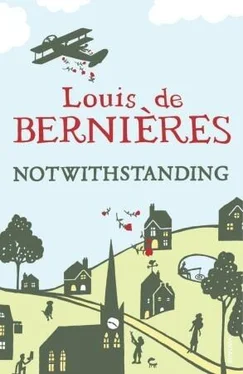Louis de Bernieres - Notwithstanding - Stories from an English Village
Здесь есть возможность читать онлайн «Louis de Bernieres - Notwithstanding - Stories from an English Village» весь текст электронной книги совершенно бесплатно (целиком полную версию без сокращений). В некоторых случаях можно слушать аудио, скачать через торрент в формате fb2 и присутствует краткое содержание. Год выпуска: 2010, Издательство: Vintage, Жанр: Современная проза, на английском языке. Описание произведения, (предисловие) а так же отзывы посетителей доступны на портале библиотеки ЛибКат.
- Название:Notwithstanding: Stories from an English Village
- Автор:
- Издательство:Vintage
- Жанр:
- Год:2010
- ISBN:нет данных
- Рейтинг книги:4 / 5. Голосов: 1
-
Избранное:Добавить в избранное
- Отзывы:
-
Ваша оценка:
- 80
- 1
- 2
- 3
- 4
- 5
Notwithstanding: Stories from an English Village: краткое содержание, описание и аннотация
Предлагаем к чтению аннотацию, описание, краткое содержание или предисловие (зависит от того, что написал сам автор книги «Notwithstanding: Stories from an English Village»). Если вы не нашли необходимую информацию о книге — напишите в комментариях, мы постараемся отыскать её.
is a funny and moving depiction of a charming vanished England.
Notwithstanding: Stories from an English Village — читать онлайн бесплатно полную книгу (весь текст) целиком
Ниже представлен текст книги, разбитый по страницам. Система сохранения места последней прочитанной страницы, позволяет с удобством читать онлайн бесплатно книгу «Notwithstanding: Stories from an English Village», без необходимости каждый раз заново искать на чём Вы остановились. Поставьте закладку, и сможете в любой момент перейти на страницу, на которой закончили чтение.
Интервал:
Закладка:
There is no one to meet Miss Agatha Feakes. But then she looks down and sees that there are hundreds of animals; there are cats and rabbits, goats and hens, guinea pigs and dogs. She is shocked to realise that she knows all their names, all their likes and dislikes, all their whimsies. It strikes her as wondrous that her life must have been so abundant in affection.
She is about to pick up the first rabbit that she had when she was six years old, but she becomes aware that someone is coalescing out of the light. He is tall and slim, he is dressed in RAF service dress, and he has his peaked cap under his right arm. On the left breast of his tunic he wears the purple and white diagonal stripes of the Distinguished Flying Cross, and the red and white diagonal stripes of the Air Force Cross. She is about to shake hands, but he leans forward and kisses her softly on the cheek. Surprised, she puts her hand to her cheek, and smells Sunlight Soap, brilliantine and eau de cologne. Casually he removes the morning’s brambles from her hair, and says, ‘Hello, old thing.’
‘Alec?’ she asks, incredulous. ‘Alec?’
Flight Lieutenant Alec Montrose raises a quizzical eyebrow and runs an elegant forefinger along his thin black moustache. He smiles, and Agatha’s lips tremble at the memory. ‘When I heard you’d been killed,’ she says, ‘I was most awfully upset. I cried buckets and buckets, for weeks and weeks. I wrapped the ring in tissue and I put it in my jewellery box, and every now and then I take it out and look.’
Alec bends down and places his cap rakishly on the head of a sleeping Labrador. When he straightens up he puts his right hand on her left hip, and says, ‘My dance, I think.’ Out in the ether Victor Sylvester’s band strikes up their favourite tune. He draws her close and she lays her head on his shoulder. It is as if he is taking away all the accumulated weariness of life; it empties out of her like water from a jug.
In the arms of Alec Montrose, Agatha waltzes and whirls away on lightened feet, and, far below, the village in which she was born and nourished, and into whose soil her body will melt away, prepares itself for the night.
AFTERWORD

There was a long period during which I persuaded myself into believing that my childhood was a rural idyll. Upon reflection I realised that in fact I spent the greater part of my youth at boarding schools. My public school was admittedly in beautiful countryside, and I spent much time working for a local farmer, or walking on the local estate and sunbathing naked in its bracken when I should have been doing sports. The estate had a gibbet, hung with the ragged corpses of multitudes of vermin, and this is presumably how its gamekeepers proved their worth. I did partially fail to grow up middle class because I had exclusively working-class jobs at first, but all this is not quite the same as growing up wearing smocks and clogs, surrounded by geese and dozens of siblings, fetching pails of warm milk, and eating dishes made of the green and chewy parts of wild animals.
My village in southern Surrey was many years past the era of rural idyll. The centuries of ‘idyll’ were in any case a period of ignorance, disease, servitude, bone-numbing cold, relentless hard work, perinatal death and extreme penury. People died not of old age, but of being worn out. The idyllic moments must have been all the more precious, and all the more memorable, for their rarity. What was really special about those times was that everyone knew everyone else. Villages were proper communities, with all that that entails in terms of social support. These days, although a small core of sociable and helpful types is always to be found, village families often live in complete isolation from each other, buttonholed by their television and computer screens, and getting in their cars to go and see their friends elsewhere. There are people in villages today who don’t know their neighbours at all, and would rather go shopping than to the village fete. Psychologically speaking, they are townies.
The villages of these islands were transformed progressively by the mechanisation of farming, rural de-industrialisation, the train, the bicycle and the motor car. In our village we no longer had just a few families who had intermarried for generations. The youngsters grew up and left, as I did, and families moved in not least because it was on the Portsmouth line to London. Every morning bowler-hatted, pinstriped gentlemen with their furled umbrellas strode to the station up New Road, all of them looking like Major Thompson. In the early 1950s my village won the Best Kept Village competition, a sure sign that it was no longer a functioning place of work, but had become simply a lovely spot to live in. The lord of the manor wasn’t some bluff old gentleman with a hunter and two Labradors, but an expert on Handel. There was no farrier, no blacksmith, no limeburner, no wheelwright, no cartwright, no bodger making chair parts in the woods. The butchers, bakers, grocers, cobblers, confectioners and saddlers had all gone. There was a Malthouse Lane, but the malthouse had become a farm. You still found hops growing in the hedgerows. No one kept a pig in their yard with the intention of cutting its throat in the autumn, and no one was obliged to live off rabbits. Poachers no longer poached out of necessity, because you could get very cheap chicken in the new Godalming Waitrose. The glass trade that had made nearby Chiddingfold world-famous had long since collapsed, on a whim of King James I. In Chilworth the vast gunpowder factories had disappeared after the Great War, and the ironmakers had vanished some time in the late eighteenth century, although there is plenty of ironstone left. The only specialist manufacturers in the area made walking sticks. I remember just two old men who had the proper Surrey accent, which has probably gone altogether by now. They used the strong postvocalic R that you still find in Dorset. There was ‘for’ard’ for ‘forward’, ‘to’n’ for ‘to him or them’, ‘hosses’ for ‘horses’, ‘they’ for ‘them’, ‘twas’ for ‘it was’, ‘mos’ for ‘most’, ‘ye’ for ‘you’ in the accusative, ‘they was’ for ‘they were’, ‘ha’ for ‘had’ when using the pluperfect. There were a few dialect words still left, and, according to Eric Parker, ‘Joe Bassetts’ had been the name for cockchafer grubs. I imagine that the dialect never was studied systematically, and is now almost lost for ever. At the beginning of the twentieth century, George Bourne noted down the speech of his gardener, Bettesworth, and anyone who is curious to know how Surrey spoke should take a look at his Bettesworth Book , and Memoirs of a Surrey Labourer . I worked for some months with a gardener who talked exactly like him.
There was a coal merchant and a brick factory. There was still a village shop, and a village pond, and a cricket green. There was still a rectory with a proper rector in it. There was still a pub, whose ceiling was decorated with a collection of chamber pots, and which to this day advertises its fare as ‘warm beer, lousy food’. They had a dog called Beulah, who had rounded canine teeth because his hobby was collecting large pebbles. Most reassuringly, there was still an affable village policeman who got about on a bicycle, and a permanently suntanned village postman who kept his boots polished like the old soldier he was and wore clips around the bottom of his trousers.
In one corner of the green was a scrapyard and travelling fair run by a family who were referred to as ‘the gypsies’. There was a time when it was proposed to set up another gypsy site at a place called Cuckoo Corner, and our gypsies joined in the protest against it, on the grounds that the new gypsies would probably be a lower class of gypsy who would give them all a bad name. Ours had a small pack of genial Alsatians that were almost unrecognisable as any breed because of their caking of mud and oil. Without the scrapyard I would never have managed to keep my Morris Minor going. They had a cleaning machine so powerful that it took the paint off my motorcycle. At the top of the hill was a school for delicate children. It was run by nuns whose suicidal driving was widely notorious. It had originally been built as a private house by a famous astronomer, who added an observatory, and was the first person in the village to have a car. There were still some small farms. One year I worked on the potato harvest, driving a tractor and trailer alongside the harvester. I had an accident with it, of course. I once helped to dismantle a chicken battery, and fell into the fragrant slurry pit at one end. My shoes were not allowed in the house thereafter, and neither were my trousers after I had worked on a pig farm.
Читать дальшеИнтервал:
Закладка:
Похожие книги на «Notwithstanding: Stories from an English Village»
Представляем Вашему вниманию похожие книги на «Notwithstanding: Stories from an English Village» списком для выбора. Мы отобрали схожую по названию и смыслу литературу в надежде предоставить читателям больше вариантов отыскать новые, интересные, ещё непрочитанные произведения.
Обсуждение, отзывы о книге «Notwithstanding: Stories from an English Village» и просто собственные мнения читателей. Оставьте ваши комментарии, напишите, что Вы думаете о произведении, его смысле или главных героях. Укажите что конкретно понравилось, а что нет, и почему Вы так считаете.












